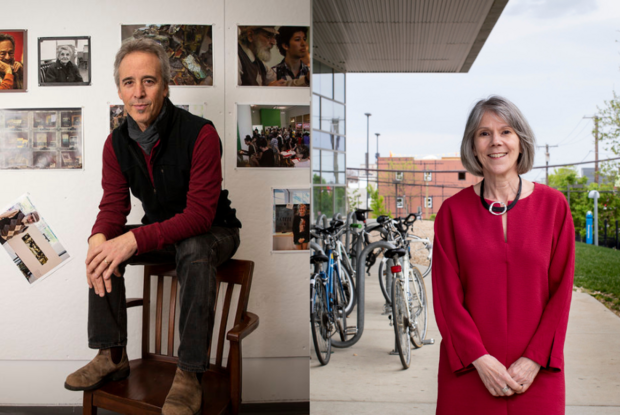Two Retiring Professors Leave a Lasting Impact After Decades of Service

When retiring Associate Professor Lynn Mandarano reflects on the most rewarding moments of her decades-long academic and professional careers, she doesn’t point to her board memberships, leadership of Tyler’s Planning and Community Development program or her many published works in peer-reviewed journals.
Instead, Mandarano speaks of the community-based projects by students in her capstone course for the Bachelor of Science degree in Community Development, such as a partnership with Asociacion Puertorriquenos en Marcha (APM), a Philadelphia-based community development corporation serving the neighborhood just east of Temple University’s main campus.
“This evolved into a four-year, serving-learning project during which students created community engagement events and walking tours using historic images and narratives, storytelling, and visioning with the goal of celebrating the neighborhood’s history and cultural identity while enhancing residents’ capacity to envision its revitalization,” said Mandarano.
Community engagement
With her expertise in community engagement, students were also introduced to important skills of professional leadership. Mandarano and her community partners provided a great model for students to learn the power of partnerships: how community insights and knowledge lead a partnership and where and when professional expertise could contribute.
Retiring Community Arts Practices Associate Professor Billy Yalowitz, who joined Tyler in 2000 and founded the school’s Community Arts Practices program, also had a significant imprimatur in his time at Tyler – teaching hundreds of students how to integrate community engagement into artistic practice and inspiring them to be active participants in society.
Yalowitz, a critically acclaimed interdisciplinary artist with extensive experience creating works that draw from public history and grassroots movements, and his students collaborated with neighborhoods throughout Philadelphia on a wide range of performance and installation works that have helped to organize communities around a variety of social justice initiatives, including environmental equity and the ethics of eminent domain.
Mandarano was only the second tenure-track faculty when she joined the program in 2005 and was instrumental in shaping its trajectory – guiding curricular refinements and expansion, and the program’s move to Temple’s main campus from the Ambler campus, its original home.
“What was most exciting about this work was observing the students utilize the skills and knowledge that they had learned while at Tyler and apply it to a real-world experience and seeing how dedicated they were to creating materials and experiences for our community partner,” she said.
Transformative impact
Jeff Doshna, Program Head of Planning and Community Development, credited Mandarano with his “being the academic leader I am today,” adding that she taught him what it meant to be a full-time professor. “Lynn led the search committee when I was hired. And for every step of the way since then, she has been a mentor.” The legacy of community-based practices that Mandarano shaped will also continue with Assistant Professor Ryan Devlin providing continuity in the program's classes focused on community engagement.
Among Yalowitz's collaborations was the Trust for Public Land Heat Response PHL project, launched to create public art that addresses the question: “Why should we care about urban heat and what can we do about it?”
Students interning with Amber Arts & Design—a leading Community Arts studio in Philadelphia— wrote and illustrated a graphic climate justice novella/coloring book based on neighborhood stories and poetry from the Fairhill neighborhood close to Tyler.
“It’s been exciting and transformative for our students to find their creative voices in neighborhood mapping and visual production, facilitating climate justice arts workshops for youth, creative research and documentation,” Yalowitz said at the time. “Students are using their arts disciplines to help to tell crucial stories.”
Lisa Kay, chair of the Art Education and Community Arts Practices Department (AECAP), lauded Yalowitz for his 25 years of teaching, mentorship and community engagement, noting that his impact on the department and program was immeasurable.
His work contributed to the shaping of the department and aligns with the spirit of community-focused initiatives that characterize the programs in art education and art therapy.
“At this junction in Billy’s dynamic career, I want to thank him for all the year of service to the department, Tyler, Temple, the surrounding communities and Philadelphia at large,” said Kay.